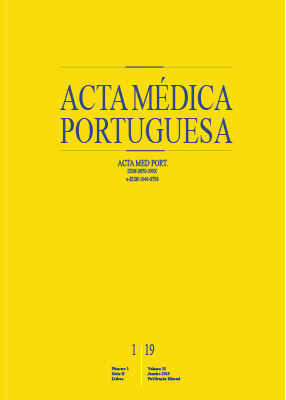Lithium in Public Drinking Water and Suicide Mortality in Portugal: Initial Approach
DOI:
https://doi.org/10.20344/amp.10744Keywords:
Drinking Water, Lithium, Portugal, Suicide, Water SupplyAbstract
Introduction: Lithium can be found naturally in drinking water. There is some evidence that natural levels of lithium in drinking water may have a protective effect on suicide mortality. The aim of this study is to evaluate if higher natural concentrations of lithium in public drinking water are associated with lower local rates of suicide in Portugal.
Material and Methods: Suicide standardized mortality ratios at 54 Portuguese municipalities within the 6-year period from 2011 to 2016 was correlated with lithium concentrations in public drinking water and socioeconomic factors using Pearson’s correlation coefficients (r) with one-tailed tests. Multivariate regression models were adjusted for well-known socioeconomic factors known to influence suicide mortality in Portugal (population density, average income per capita, unemployment rates and proportion of Roman Catholics).
Results: The average lithium level, as evidenced by raw values for 54 municipalities, was 10.88 μg/L (standard deviation = 27.18). There was no statistically significant correlation between lithium levels and suicide standardized mortality ratio (r = 0.001, p-value = 0.996). There was a statistically significant higher suicide standardized mortality ratio for males (p-value = 0.000). When analyzed separately for both sexes, no statistically significant correlation between suicide standardized mortality ratio and lithium levels was found (male r = 0.024, p-value = 0.862; female r = 0.000, p-value = 0.999). No association between suicide standardized mortality ratio and socioeconomic factors was found: population density (r = -0.144, p-value = 0.300), average income per capita (r = -0.112, p-value = 0.418), unemployment rates (r = -0.001, p-value = 0.994), and proportion of Roman Catholics (r =- 0.150, p-value = 0.278).
Discussion: Unlike most international studies regarding natural lithium levels and suicide risk, no inverse relation was found in Portugal. Factors such as the country’s low suicide rate, confunding suicide risk variables, and unaccounted lithium intake might have influenced these findings.
Conclusions: No association between lithium in public drinking water and suicide rates was found in Portugal.
Downloads
Downloads
Published
How to Cite
Issue
Section
License
All the articles published in the AMP are open access and comply with the requirements of funding agencies or academic institutions. The AMP is governed by the terms of the Creative Commons ‘Attribution – Non-Commercial Use - (CC-BY-NC)’ license, regarding the use by third parties.
It is the author’s responsibility to obtain approval for the reproduction of figures, tables, etc. from other publications.
Upon acceptance of an article for publication, the authors will be asked to complete the ICMJE “Copyright Liability and Copyright Sharing Statement “(http://www.actamedicaportuguesa.com/info/AMP-NormasPublicacao.pdf) and the “Declaration of Potential Conflicts of Interest” (http:// www.icmje.org/conflicts-of-interest). An e-mail will be sent to the corresponding author to acknowledge receipt of the manuscript.
After publication, the authors are authorised to make their articles available in repositories of their institutions of origin, as long as they always mention where they were published and according to the Creative Commons license.









